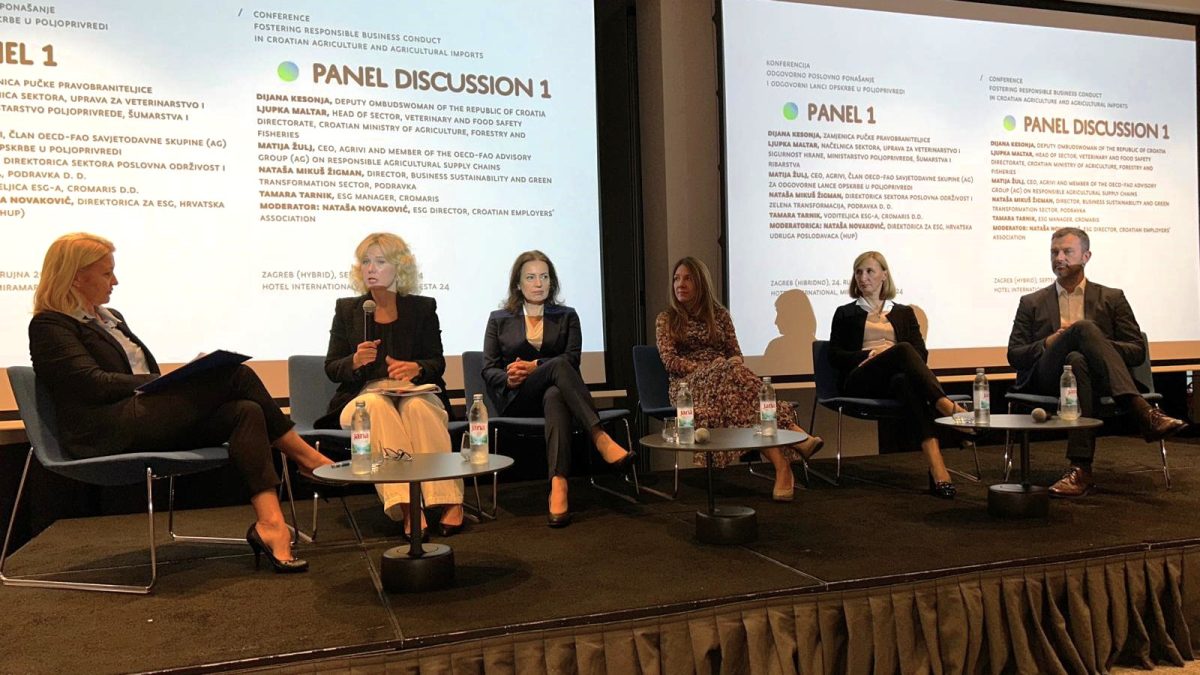Deputy Ombudswoman Dijana Kesonja participated on Tuesday, 24 September 2024, in the conference on responsible business conduct in agriculture, organized by the Ministry of Economy in cooperation with the Ministry of Agriculture, Forestry and Fisheries, the Food and Agriculture Organization (FAO), and the Organisation for Economic Co-operation and Development (OECD), regarding the implementation of the OECD-FAO Guidelines for Responsible Agricultural Supply Chains.
As one of the panelists, Deputy Kesonja explained the role of the Ombudswoman’s Office in relation to the topic of responsible business conduct, focused on the protection of human rights and environmental preservation, through several institutional mandates.
Namely, as the national human rights institution, the Ombudswoman acts in cases of labour rights violations in the public sector, as well as to protect the right to a clean, healthy, and sustainable environment, and monitors the protection of these rights. As the central national body for combating discrimination, the Office works to reduce inequalities in the field of work and employment across both the public and private sectors, and also functions as the external body for whistleblower reporting and protection.
Deputy Kesonja also pointed out that the recently adopted EU Corporate Sustainability Due Diligence Directive represents a legally binding instrument, unlike the UN Guiding Principles on Business and Human Rights or the OECD Guidelines for Due Diligence for Responsible Business Conduct. This means that all EU member states are required to implement it into their national legislation. She also highlighted Croatia’s specific position as a country currently in the process of accession to the OECD, which entails meeting certain criteria in the area of responsible business conduct, while simultaneously being obligated to align its legislation with the aforementioned Directive.
The adoption of the Directive and the implementation of the necessary procedures, Deputy Kesonja emphasized, will certainly contribute to strengthening the business climate. She also noted the value of considering the adoption of specific sectoral guidelines for high-risk industries, as foreseen in international instruments.
The Deputy Ombudswoman also emphasized the issue of modern slavery, one form of which is forced labour, affecting more than 25 million people worldwide, up to 40 percent of whom are employed in the private sector. Although many are unaware of the existence of modern slavery, this unfortunately does not mean it does not exist—it is a global problem that must be addressed.
Deputy Kesonja also commented on the labour shortages in various sectors, which has led employers to increasingly hire foreign workers, including from distant Asian countries, through employment mediation agencies. It is essential to ensure that foreign workers enjoy the same rights as domestic workers, that they work in dignified and safe conditions, and that they are not subjected to illegal recruitment fees or other adverse effects.
In the panel discussion on global standards, import regulations, and responsible business conduct in agricultural supply chains, alongside Deputy Kesonja were Ljupka Maltar, Head of Sector at the Ministry of Agriculture, Forestry and Fisheries; Matija Žulj, CEO of Agrivi and member of the OECD-FAO Advisory Group (AG) on Responsible Agricultural Supply Chains; Nataša Mikuš Žigman, Director of Business Sustainability and Green Transformation at Podravka; and Tamara Tarnik, Head of Environmental, Social, and Corporate Governance (ESG) at Cromaris. The panel was moderated by Nataša Novaković, Director of ESG at the Croatian Employers’ Association.
More information on the right to work and the right to a clean, healthy, and sustainable environment can be found in the report of the Ombudswoman.


